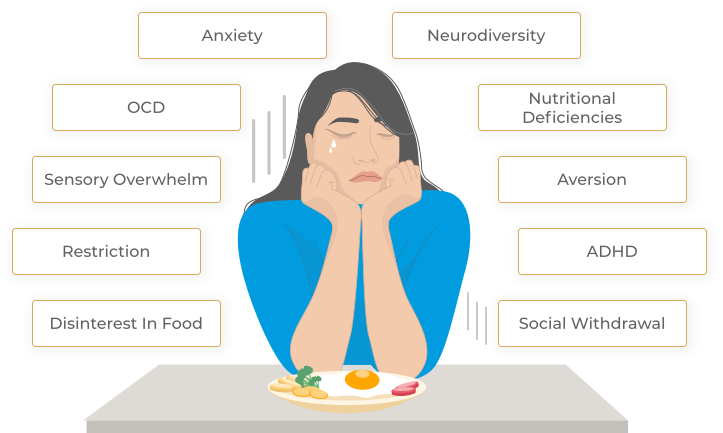Inclusive ARFID Treatment
- Comprehensive Care: Personalized Treatment Plans Tailored Specifically For ARFID
- Specialist Team: Professional, Evidence-Based Care with Therapists Trained in Neurodiversity
- Caring Environment: Compassionate Support for Sensory Desensitization to Food
ARFID TREATMENT
Finding Hope & Strength In Your Recovery
Are mealtimes a struggle for you or your loved one? Do you find yourself overwhelmed by the textures, tastes, or appearance of certain foods?
Unlike other eating disorders, ARFID is not associated with a distorted body image or fear of gaining weight. Instead, individuals with ARFID may have an apparent lack of interest in eating, avoid foods based on sensory characteristics like texture or smell, or have concerns about potential negative consequences of eating, such as choking or vomiting.
Navigating through the challenges of Avoidant/Restrictive Food Intake Disorder (ARFID) can feel daunting, but you are not alone. Our compassionate team is here to support you every step of the way.
With our specialized ARFID treatment, you can experience:

THERAPY
Personalized approach that respects and understands your unique needs

EXPERT TEAM
Expert team offering integrated psychological, nutritional, and medical care.

SUPPORT
Supportive environment fostering trust and promoting positive food experiences.
Don’t let food limitations control your life. Take the first step towards a healthier relationship with food and a more fulfilling life. Seek treatment now and regain the freedom you deserve.
TAKE CONTROL OF YOUR HEALTH TODAY – WE ARE HERE TO HELP
Struggling with weight and eating challenges? You don’t have to face it alone.
Our compassionate team is ready to listen, support, and guide you toward a healthier, happier life.
Book your free call now and take the first step.
Alex – Do You Resonate With His Story?
WHEN FOOD BECOMES THE ENEMY: NAVIGATING LIFE WITH ARFID
Alex, a 20-year-old university student, has struggled with Avoidant/Restrictive Food Intake Disorder (ARFID) since childhood. From a young age, Alex exhibited extreme sensitivity towards specific food textures and flavours, only feeling comfortable consuming a narrow range of foods that were bland and had a uniform texture. This has manifested in intense aversions to foods that others might find innocuous, such as mushy vegetables or spicy dishes.
These preferences have led Alex to maintain a diet that consists mostly of plain pasta, bread, select fruits, and a few types of dairy. Any deviation from these “safe” foods triggers significant anxiety, often accompanied by a fear of choking or feeling unwell, despite having no past incidents of choking or food-related illnesses.
Social events involving food present a significant challenge for Alex. University life, with its frequent social gatherings and shared meals, has often left Alex feeling isolated and anxious. On several occasions, Alex has declined invitations to go out with friends or attend events where unfamiliar food would be a central focus. This avoidance has impacted Alex’s social life and increased feelings of anxiety and stress related to social interactions.
Additionally, the restrictive eating habits have led to nutritional deficiencies, causing Alex to feel fatigued and sometimes affecting concentration in classes. Despite being aware of these challenges, Alex struggles with trying new foods due to the deep-seated fears and discomfort associated with ARFID.
ADHD, Neurodiversity & ARFID – Understanding The Interplay
The connection between ADHD, neurodiversity presentations and Avoidant/Restrictive Food Intake Disorder (ARFID) is complex, and shows significant overlap and interplay.
Prevalence in Autism Spectrum Disorder (ASD) – Research indicates a higher prevalence of ARFID among individuals with ASD. Sensory sensitivities common in autism, such as heightened sensitivities to textures, tastes, and smells, can contribute to restrictive eating patterns.
Sensory Processing Differences – Many neurodivergent individuals, including those with ADHD, ASD, and Sensory Processing Disorder, experience atypical sensory processing, which can lead to the avoidance of certain foods due to aversion to specific sensory experiences.
Anxiety & Rigidity – Neurodivergent individuals often exhibit tendencies towards anxiety and rigid thinking, which can manifest in highly selective eating habits or the refusal of unfamiliar foods due to fear or discomfort.
Comorbid Mental Health Conditions – Co-occurring conditions, such as anxiety and obsessive-compulsive behaviours, are more common in neurodivergent populations and may amplify food-related fears and avoidance found in ARFID.
Developmental Considerations – Developmental milestones may differ in neurodivergent individuals, which can affect feeding behaviours and contribute to prolonged feeding difficulties, increasing the risk of ARFID.
Behavioural & Communication Challenges – Challenges with communication and social behaviour in neurodivergent individuals can make it difficult to express or negotiate food preferences, often leading to restrictive eating patterns.
It is important to consider neurodiversity when diagnosing and treating ARFID, and our tailored approaches at WeightMatters account for sensory and cognitive differences so we can provide effective management and support.

MEET JAMES, OUR FOUNDER & CEO
James shares how we work with ARFID treatment at WeightMatters.
ARFID THERAPY & TREATMENT
The sensory sensitivities and strong food aversions associated with ARFID can significantly impact your quality of life and well-being. If you’re seeking a structured approach to help navigate these challenges, our comprehensive treatment at WeightMatters supports your journey towards recovery.

THERAPY
Tailored therapy sessions address underlying anxieties and food-related fears, fostering healthier eating experiences and improved coping strategies.

NUTRITION
We create personalised meal plans that cater to your dietary needs while gradually introducing a variety of foods in a safe and supportive environment.

MEDICAL
Medical evaluations and continuous monitoring to ensure your physical health is prioritised throughout the recovery process.
Recovery from ARFID is transformative, and you can reclaim your relationship with food and nurture a more fulfilling and balanced life.
Let us support you in creating a brighter, more hopeful future.
It’s Time To Heal.
ARFID Therapy
ARFID therapy blends education, cognitive restructuring, behavioural techniques and emotional support. Our expert team offers:
Initial Assessment – We conduct a comprehensive assessment to understand an individual’s specific food fears, eating patterns, and any emotional or psychological factors contributing to ARFID.
Psychoeducation – We provide education about ARFID, explaining its nature and impacts, to help the individual and their family better understand the disorder and help foster a supportive home environment.
Sensory Integration Techniques – We gradually address hypersensitivity to food textures, smells, or tastes by integrating sensory-based interventions, to promote greater acceptance of diverse foods.
Cognitive-Behavioral Therapy (CBT) – CBT focuses on reshaping negative thoughts and behaviours related to food. This involves working with individuals to gradually challenge their food-related fears and anxieties, promoting healthier eating patterns.
Exposure Therapy – Our skilled professionals help individuals confront and overcome their fears through gradual and repeated exposure to diverse foods in a safe and supportive environment, decreasing the avoidance behaviours linked to ARFID.
Mindfulness & Relaxation Techniques – These are integrated into our programme to help reduce eating-related anxiety and enhance overall resilience, providing valuable tools to cope with stressors.
Emotional Support – Offer ongoing emotional support and encouragement to cope with the difficulties of changing food-related behaviours and attitudes, and to reduce feelings of social isolation.
Managing Wider Mental Health Issues – We explore and work with any co-existing psychological issues such as anxiety, depression, or trauma that may exacerbate or be exacerbated by ARFID symptoms.
Progress Monitoring – Continuously monitor and adjust the therapy plan according to the individual’s progress and changing needs, ensuring a dynamic and responsive approach to treatment.
Building Coping Skills – Teach and reinforce coping strategies to help the individual handle situations that trigger food-related anxieties outside of therapy sessions.
By offering this holistic support, our psychotherapists play a critical role in helping individuals with ARFID move towards healthier eating patterns and improvement in their overall quality of life.
Nutritional Interventions
Nutritional rehabilitation is critical in ARFID treatment. Our registered dietitians work closely with clients to ensure their dietary needs are met through:
Nutritional Counseling/Education – We offer personalised nutritional counselling to guide diet improvements, using fortified foods or supplements when necessary to meet specific nutritional needs.
Gradual Diet Expansion – Respecting individual comfort levels and preferences, our dietitians develop plans to incrementally increase dietary variety, prioritising nutritional balance.
Meal Planning and Monitoring – Our structured meal planning ensures consistent nutritional intake, helping track progress and adjust strategies as necessary.
Nutritional Supplementation – In cases of significant nutritional deficiency, targeted supplements support health and well-being, forming a part of the client’s tailored nutrition plan.
Medical Interventions
Our medical team ensures that each client receives comprehensive care, addressing the health effects of ARFID:
Regular Medical Monitoring – We provide ongoing health assessments to monitor for potential nutritional deficiencies or related health issues, adapting treatment plans as needed.
Nutritional Supplements – Doctors may prescribe vitamins, minerals, or high-calorie supplements to maintain nutritional adequacy and support weight stabilisation when diet alone is insufficient.
Gastrointestinal Health Assessment – For individuals experiencing gastrointestinal symptoms impacting their eating, evaluations by our network of gastroenterologists offer insights and additional support.
Medication Management – Though not typically the first line of treatment, our medical team may consider medications to address co-occurring conditions such as anxiety or depression that may exacerbate ARFID symptoms.
ARFID TREATMENT – GETTING STARTED
We believe it is important for clients to begin their journey by focusing on the area most impacting them. Some might initially start with therapy to address psychological and emotional factors, while others might opt to see a nutritionist first to establish a healthier eating structure.
As you progress forward through your ARFID treatment, additional services can be seamlessly integrated into your plan. Our Healing Disordered Eating: Rebalance programme allows you to blend both our psychology and nutrition services.
We understand that effective ARFID treatment needs to be both personalised and comprehensive. Let us take the time to understand your struggle, and develop a programme that transforms your life.
It is time to feel hopeful, heal, and start your journey to recovery.
Call us now, or book a free assessment call with our friendly client services team, who will answer any questions you have.
IT’S TIME TO START YOUR HEALING JOURNEY
You can discover our clear pricing structure.
SERVICES WE RECOMMEND FOR ARFID TREATMENT
Here are the WeightMatters services we recommend for ARFID treatment.
IF IT FEELS MORE COMFORTABLE, EMAIL US
Do you have a question about our treatment and support?
Leave your details below, and we will come back to you with a personalised response.
